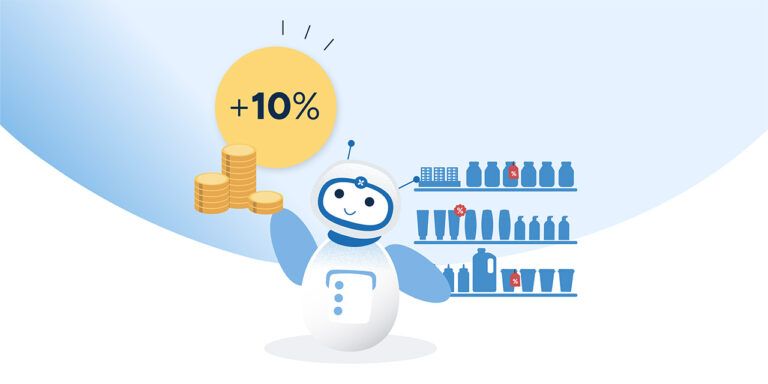The wholesale advantage: The power of automation in streamlining distribution
Jun 3, 2024 • 5 min
In the ever-evolving world of wholesale, automation is no longer just a tool—it’s the blueprint for success.
Wholesalers play an important part in the supply chain, bridging manufacturers and the marketplace. Yet, this role comes with unique challenges, including the constant pressure to remain relevant amidst the threat of being bypassed by direct supplier-customer deliveries. These risks are even more prominent among large retailers who now have significant negotiation power with their suppliers.
Additionally, plenty of wholesalers must tackle the inefficiencies of manual processes in ordering, inventory management, and customer service. And they must do this all while navigating slim profit margins and a highly competitive environment.
By embracing automation, wholesalers can address these challenges head-on and unlock new growth opportunities, enabling them to respond more dynamically to market demands and customer needs.
3 key automation advantages in wholesale
As the wholesale industry evolves, automation technology has become a necessity to maintain and expand a wholesaler’s market presence, ensuring they remain competitive.
1. Forward buying and strategic stock management
Wholesalers are familiar with the nuances of forward buying—leveraging bulk purchases to seize cost advantages or meet anticipated demand. The challenge, though, often lies in balancing buying opportunities and the risks of stock obsolescence or warehouse capacity issues.
The key to mastering this balance is leveraging advanced forecasting and replenishment systems capable of automating procurement from multiple suppliers that each have varying prices, availabilities, and lead times. These systems can select the most advantageous supplier offers, crafting order proposals that maximize purchase savings while meticulously managing the risk of overstocking and spoilage.
Retailers can navigate one-time offers and temporary price reductions, all while tracking rebate agreements to ensure quota fulfillment for manufacturer reimbursements. Ideally, this selection process will also factor in supplier reliability to safeguard product availability by recognizing that the suppliers with the most enticing offers may not always be able to guarantee timely and complete deliveries.
It’s not practical for wholesalers to handle this level of complexity with manual processes. By implementing advanced tools and automation, they will find it easier to take advantage of all the savings opportunities and fully utilize purchasing strategies.
2. Navigating supply chain disruptions
The wholesale supply chain is faced with challenges like product integrity, and supplier reliability, and in the case of pharmaceuticals, strict regulatory demands. Both predictable and unpredictable supply constraints add even further to these complexities. Predictable constraints result from transport capacity and supplier delivery limitations, while unpredictable constraints may arise from manufacturing glitches, regulatory shifts, or sudden demand shifts.
Automation emerges as a critical tool in this landscape, as it can incorporate advanced analytics and machine learning, offer real-time supply chain visibility, predict shortages, and recommend alternative suppliers or products. Thus, automation can help wholesalers preemptively mitigate supply disruptions.
When shortages occur, wholesalers can leverage automation to create flexible order strategies and adjust order quantities based on real-time inventory levels, predicted demand, and supplier lead times. An automated system can also prioritize orders for essential products or allocate limited stock among distribution centers to best serve customer channels based on predefined criteria. This allocation will help ensure equitable distribution during shortages.
3. Scaling with automation
By automating routine tasks such as order processing, inventory management, and customer service, wholesalers can significantly decrease the need for manual labor, allowing staff to concentrate on strategic initiatives that propel business growth. This efficiency means that as transaction volumes increase and the business expands, the quality and reliability of service remain unaffected.
Furthermore, automation offers a cost-effective strategy for wholesalers to overcome financial hurdles. While initial investments in automation technology are required, improvements in operational efficiency and accuracy promise substantial financial returns.
Automated systems enhance market visibility through real-time insights into sales trends, inventory levels, and customer preferences. This level of automation enables data-driven decision-making that can refine product offerings and pricing strategies while identifying market opportunities.
Ultimately, automation enables wholesalers to maximize resource utilization, streamline operations, and expand sustainably to secure a competitive edge and ensure long-term business success.
WATCH: Wholesale Supply Chain Pain: Data, Demand, and Disconnection
Success in automation: Galexis
In the complex pharmaceutical industry, Galexis, a leading Swiss wholesaler, stands out as an example of the efficient use of automation. With over 100,000 products to manage, Galexis implemented a new technology solution to overhaul their replenishment process, aiming for near-perfect availability while reducing inventory levels. Previously, their system operated at a 48% automation level, struggled with seasonal variations, and required manual confirmation for each article, a time-consuming task given their vast product range.
The implementation of an automation-heavy tech solution marked a turning point. The solution’s flexibility and ease of use allowed Galexis to tailor processes to their needs, significantly boosting efficiency. They found that implementing a system that could account for seasonal trends at the shelf level and predict future demand with speed and precision—calculating 50 million SKUs in under two hours—delivered major benefits.
The results speak for themselves: upon implementation of an automated system, Galexis saw inventory turnover increase by 12% within four months, automation levels nearly doubled from 44% to 88%, and product availability soar above 98%. Additionally, productivity increased by 47%, enabling staff to generate more orders in less time. The success of Galexis underscores the critical role of automation in enhancing operational efficiency, reducing waste, and maintaining high service levels in the wholesale sector.
Benefits of being an optimized and consistent supplier
Wholesalers that successfully implement automation across their operations, from automated warehouses to inventory management and customer service, enjoy several benefits that reinforce their position in the supply chain:
- Increased collaboration opportunities: An optimized supply chain operation attracts more business partners. Retailers and manufacturers seek reliable wholesalers who consistently meet their needs precisely and efficiently. Automation enables wholesalers to become preferred partners, leading to long-term contracts and collaborative opportunities.
- Reduced risk perception among partners: Automation minimizes the likelihood of errors, delays, and stockouts, lowering the risk perception among retailers and manufacturers. Partners are more likely to engage in strategic collaborations, such as exclusive distribution agreements or joint marketing initiatives, with wholesalers they perceive as low risk.
- Enhanced competitive advantage: Automated operations allow wholesalers to respond more quickly to market changes and customer demands. This agility and the ability to maintain high service levels at lower costs provide a competitive edge in a crowded market.
- Improved financial performance: Wholesalers can save significantly by optimizing operations and reducing reliance on manual processes. They can then reinvest the savings in the business to fuel further growth or improve profit margins.
Embracing automation and growth in wholesale
Automation has revolutionized the wholesale industry by addressing critical challenges and opening new opportunities for growth and efficiency. Wholesalers who strategically invest in automation can enhance their market visibility, operational efficiency, and competitive advantage. As the wholesale industry evolves, wholesalers will only be able to remain successful while maintaining—or improving–their market position by increasing automation.
For wholesalers ready to transform their operations, the first step toward efficiency and streamlined processes is delving into automation solutions by identifying key operational areas for improvement, consulting with technology providers, and learning from industry peers. This strategic investment will optimize current operations and position businesses for long-term success in a competitive market.



